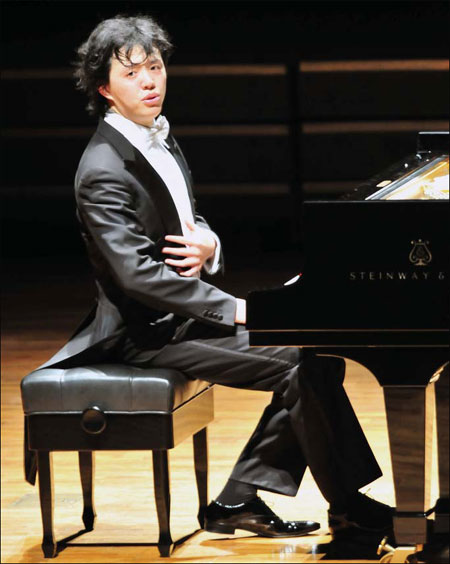Red, bright and true
Updated: 2011-10-07 10:17
By Liu Lu (China Daily)
|
|||||||||
|
|
Artist's new album opens Chinese musical doors to the West
Wearing a casual white T-shirt paired with navy blue jeans and trendy sneakers, pianist Li Yundi looks every bit a Mando pop star. The 29-year-old is a star, a huge celebrity, but moves in very different musical circles within the world of classical performance. Last month he launched his new album Red Piano, the first in which he focuses only on Chinese folk music masterpieces.
Li says the recording is a milestone turning point in his musical career. After years of playing Western classical music Red Piano reveals the young man's desire to look for new inspiration by returning to his own cultural roots.
"I hope Red Piano opens a new gateway for music lovers in the West. They may better understand the folk features of Chinese music and it may spark their interest to know more about China, the place where I come from," Li says.
Li knows the power of music and its global reach. "Music is the best communication tool that does not need language and can bring people from different cultures together. My new album is an opportunity to win glory for Chinese music."
Li also knows about the glory of music.
When Li was just 18 he walked onto the international stage and was rocketed to fame when he won the International Frederick Chopin Piano Competition in Warsaw in 2000. He became the youngest winner of this prestigious prize.
After the victory, Li studied in Hanover, Germany, with Israeli classical pianist Arie Vardi. Since then Li has dedicated himself to the works of Chopin, and proved himself a stunningly talented pianist with his masterly techniques and wondrous colorings of many Chopin recitals.
"I prefer Chopin's elegant and artistic music style and admire his persistent spirit of musical creation. I want to capture the inner world of Chopin and also ponder my own feelings when I play his music."
Li's first album, an all-Chopin disc, was released in 2002. The following year he made his debut in Carnegie Hall in New York and received considerable acclaim.
Li's decade-long music career has been filled with diligence and hardships, but has also been blessed with numerous awards, concerts, tours, and 11 albums to date.
New York piano critic Harris Goldsmith has lauded Li's "patrician elegance" and his rendering "exquisite artistry from one of the greatest talents to surface in years, nay, decades".
His firm foothold in the higher echelons of international classical music has earned him the title of "Piano Prince of China".
Chinese media portray Li as a poetic pianist with a pop-idol face and "Chopinesque temperament".
In 2010 Li performed 90 concerts of Chopin's works around the world and released an album of the complete Chopin Nocturnes to commemorate the Polish composer's 200th birthday.
Although he is regarded as one of the best performers of Chopin, Li doesn't want to be labeled as a certain type of artist. He also excels at playing the works of other famous composers, such as Liszt and Bach.
But he has never been shy about expressing his ardent love toward his own country's folk music and has a long standing habit of playing a Chinese song as an encore at all his classical concerts.
Li continued this tradition at his first performance at this year's Edinburgh International Festival on Sept 3 by wraping up his concert with a famous Chinese folk song In A Far Away Place. The gesture won him raucous aplause from the audience.
"As a Chinese person, the soul of my musical art is deeply rooted in the Chinese culture. This never changes no matter where I go or no matter which artist I play."
With this motivation in mind, the release of the Red Piano is a long-cherished wish.
Li says although the piano is a Western musical instrument, there are many great Chinese musical works that have been written for it.
As a world-renowned Chinese pianist, he says he feels responsible to promote beautiful Chinese melodies to music lovers home and abroad. "Now is the time for me to make up their minds."
Li says his role model Chopin inspired him to make a brand new recording of Chinese songs. Chopin was a patriotic musician and all his works have profound national characteristics centering around Polish culture.
"It is no exception that all the famous pianists in history played music of their own cultures, so as a Chinese, I am more inclined to play Chinese music, although it's challenging for me," Li says. "It's an honor for me to express my love for my motherland and promote the splendid Chinese music culture through playing Chinese music works on my piano."
According to Li, the name of Red Piano is a result of careful selection, which has been attached with a special meaning, as red is the signature color of China that symbolizes the fusion of passion, vigor and good luck in Chinese culture. "Red is also the best color to show my love to my country," Li says.
The album has includeed the most famous Chinese concerto, including the Yellow River Piano Concerto, one of the best-known Chinese piano works composed in 1969, Liuyang River, a folk song from Central China's Hunan province, and Pi Huang, a newly adapted Peking Opera piece for piano.
But Li is far from satisfied with this single album, and has mapped out a bigger plan for his all-Chinese piano program. He says he will adapt more classic Chinese songs and opera pieces into piano works in the future and plans to stage concerts featuring only Chinese classics.
"China has a large pool of music but within this pool, each type of music has a distinct local characteristic. The music is filled with historical significance and with Chinese cultural traits."
Li says he plans to collaborate with other young Chinese musicians to rearrange and record more classic Chinese music. "I expect international audiences can learn the profound Chinese culture by listening to my piano renditions," he says.
Li believes that only when Chinese pianists have beautifully captured the soul of Chinese music can they arouse the enthusiasm of pianists from other nations to play music made in China. "I also hope I can create Chinese classical music on my own some day. Of course, this will take time."









